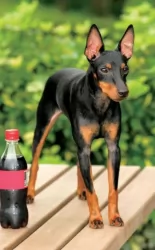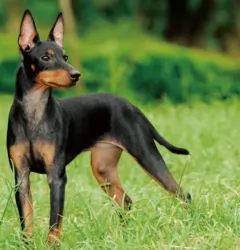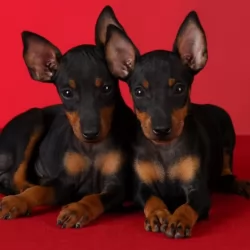 MyDogBreeds
MyDogBreeds Toy Manchester Terrier is originated from United Kingdom but Dutch Shepherd is originated from Netherlands. Toy Manchester Terrier may grow 32 cm / 12 inches shorter than Dutch Shepherd. Toy Manchester Terrier may weigh 28 kg / 61 pounds lesser than Dutch Shepherd. Both Toy Manchester Terrier and Dutch Shepherd has almost same life span. Toy Manchester Terrier may have less litter size than Dutch Shepherd. Toy Manchester Terrier requires Low maintenance. But Dutch Shepherd requires Moderate maintenance
Toy Manchester Terrier is originated from United Kingdom but Dutch Shepherd is originated from Netherlands. Toy Manchester Terrier may grow 32 cm / 12 inches shorter than Dutch Shepherd. Toy Manchester Terrier may weigh 28 kg / 61 pounds lesser than Dutch Shepherd. Both Toy Manchester Terrier and Dutch Shepherd has almost same life span. Toy Manchester Terrier may have less litter size than Dutch Shepherd. Toy Manchester Terrier requires Low maintenance. But Dutch Shepherd requires Moderate maintenance
 The Toy Manchester Terrier comes from Manchester and came about by breeding the Manchester Terrier with smaller dog breeds.
The Toy Manchester Terrier comes from Manchester and came about by breeding the Manchester Terrier with smaller dog breeds.
Looking like a Doberman Pinscher, the American Toy Manchester Terrier Club was formed in the 1930s and the dog was recognized in 1938 by the American Kennel Club.
It is believed that the Black and Tan Terrier was also possibly crossed with Whippets. The dog is categorized as a Terrier or as a Toy breed.
 The Dutch Shepherd is of Dutch origin, hailing from the Netherlands. They were originally used as herding dogs on the farms, where they became a jack-of-all-trades type of dog.
The Dutch Shepherd is of Dutch origin, hailing from the Netherlands. They were originally used as herding dogs on the farms, where they became a jack-of-all-trades type of dog.
The Dutch Shepherd in those days, 100 odd years ago, were also known as Hollandse Herders.
These dogs are more rare in modern days, but when you do find them, they are being used as police or security dogs, as guides for the blind, or simply as family friends.
 Looking much like a small Doberman Pinscher, the Manchester Terrier is the miniature version of the standard Manchester.
Looking much like a small Doberman Pinscher, the Manchester Terrier is the miniature version of the standard Manchester.
He weighs in the region of 2 to 5kg and stands at between 25 and 30cm in height. He has a sleek, short coat which is black and tan. He is lithe and muscular, bred back in the day to kill vermin. He has large, broad erect ears which taper to a point.
The Toy Manchester Terrier is a gentle but energetic dog, a great choice for an active family. Throw a ball and you’ll see how he loves to give chase, and he’ll also love his walk every day.
They’re adaptable too, so if you live in the countryside or the city, he can be your friend and companion there.
Training and socialization are excellent for all dogs, particularly ones with a stubborn, independent streak such as with this dog. He is intelligent and will learn quickly. They’re alert too so you can expect him to be a good watchdog.
 The Dutch Shepherd dog is very similar in appearance to the popular German Shepherds, being a medium to large sized dog.
The Dutch Shepherd dog is very similar in appearance to the popular German Shepherds, being a medium to large sized dog.
The males are slightly heavier than females, but both males and females can stand between 55 and 62cm and weigh between 20 and 32kg.
There are actually 3 varieties found in the Dutch Shepherd dogs - short-haired, long-haired, and wiry or rough-haired. The dog has a double coat, consisting of a woolly undercoat and a top coat. The basic color of the coat is gold or silver through to red, giving rise to the brindle variations. Too much black or white seen in the fur is considered a fault.
In 1914 it was decided that brindle coats would distinguish them from the others.
The eyes of the Dutch Shepherd are dark, almond shaped and slightly slanting, while the medium sized ears are erect and high on the head and the thick tail is slightly curved. The dog has an unusually long tongue which is often found hanging out.
Early training and socializing for this dog is important so that he can learn to stay calm around new people, or visitors to the property.
The beautiful Dutch Shepherd doesn’t like being left alone for too long, loving rather to be involved with all that the family is involved in. They get on well with other pets in the home as well as being child-friendly.
They are happy dogs, who can also be smart and cunning, therefore highly trainable. They soak up new commands easily. Dutch Shepherds are also good watchdogs as they are fiercely loyal, and do not take kindly to strangers.
 The Toy Manchester Terrier is full of beans and will provide you with lots of fun. They're sociable and love being in the presence of their human family.
The Toy Manchester Terrier is full of beans and will provide you with lots of fun. They're sociable and love being in the presence of their human family.
They get on well with kids and pets in the home and are brave, alert and feisty. He may be small, but he is full of personality and he’s just waiting to fill your home with his bright charm, promising to be a loyal, loving pet.
 Your alert, intelligent and somewhat rare Dutch Shepherd is a loyal, protective dog, and while he can be aggressive around intruders and be a great guard dog, he can also be a gentle, loving animal around his human family members.
Your alert, intelligent and somewhat rare Dutch Shepherd is a loyal, protective dog, and while he can be aggressive around intruders and be a great guard dog, he can also be a gentle, loving animal around his human family members.
Though his tongue is long and often hangs out, you won’t have to contend with drooling. He is a wonderfully active dog and doesn’t easily gain weight. He isn’t a barker or howler, and his exceptional intelligence makes him highly trainable.
Whether there are children or other animals in the house, you can rely on your Dutch Shepherd to get on well with them, making him a wonderful family pet and canine friend.
 The Toy Manchester Terrier is a healthy dog breed and can reach anything between 14 and 16 years of age. Good food and exercise can stave off illness, but there are some common dog illnesses that any dog can succumb to.
The Toy Manchester Terrier is a healthy dog breed and can reach anything between 14 and 16 years of age. Good food and exercise can stave off illness, but there are some common dog illnesses that any dog can succumb to.
This occurs when there are problems with the thyroid hormone. You might find skin problems with your pet, lethargy and even hair loss. Your vet might suggest hormone replacement, but there are always natural products for dogs too.
This is when there is degeneration of the head on the femur bone so that there is also joint inflammation.
It is thought that the condition is brought on by problems with blood supply to the femoral head. Lameness sets in and then your vet will want a medical history of your pet’s health.
 The Dutch Shepherd dogs are the healthiest of the Shepherd breeds. They have relatively few health problems.
The Dutch Shepherd dogs are the healthiest of the Shepherd breeds. They have relatively few health problems.
However, like the German Shepherds they may develop hip dysplasia, but this is in fact fairly rare. Get your pet to the vet if you suspect this in your dog because it can lead to lameness.
In 2018 the University of Minnesota identified a disease in Dutch Shepherds called Miositis. This is an inflammatory myopathy causing painful inflammation of the skeletal muscle tissue.
 Make sure you provide your pet with yard space and that he is well exercised and occupied. Provide him with exercise and give him attention.
Make sure you provide your pet with yard space and that he is well exercised and occupied. Provide him with exercise and give him attention.
Provide him with a dry, quiet resting place. If he spends time outdoors, he must have shade and sun as well as shelter from the rain.
Provide him with good food in his own special bowls. If you feed him dry kibble, make sure to give him a quality one with vitamins and minerals. The food’s labeling will guide you as to what to buy, but your vet is also a good source of useful information. Try to give him some home-made food too. Boiled chicken, brown rice, sweet potatoes and spinach for instance, are excellent examples. Dont add in exotic spices and curries that can give him an upset stomach. Make sure he has a constant supply of fresh, cool water.
Get your Manchester to the vet if he is ill. Make sure his vaccines are up to date.
He has short hair and is a low maintenance dog. Brush him once or twice a week to keep his shiny coat healthy. Check inside his ears for redness and give him a good check-over to make sure he doesn’t have any odd looking lumps or sores on his body.
 Unfortunately Dutch Shepherds shed quite a bit of hair during their shedding period in spring and autumn. This makes regular brushing important during these seasons so as to remove the dead hairs, especially from the undercoat.
Unfortunately Dutch Shepherds shed quite a bit of hair during their shedding period in spring and autumn. This makes regular brushing important during these seasons so as to remove the dead hairs, especially from the undercoat.
The wire- or rough-haired variety shouldn’t be brushed but should rather be groomed by a professional groomer every 6 months or so.
Their nails need to be trimmed when necessary, to avoid cracking, splitting, or an injury.
Their ears can be cleaned weekly to get rid of any debris or wax build-up. This, if left, can lead to infection. Brush his teeth 2 or 3 times a week to avoid dental disease which brings on a host of illnesses.
These dogs do need regular exercising, and at the same time need to be physically and mentally stimulated. He is the kind of dog that has been used for herding purpose on the farm and he just craves activity. Take him with you on your walks and include him in ball games, hikes, jogging, swimming or when you go cycling – he is game for all kinds of activities.
The formula for their diet would be that of a medium to large dog with high energy levels. The top commercially manufactured foods have been developed to include all the important vitamins and minerals. Fish oil can also be added to their food to keep the coat shiny.
Add in cooked rice, cooked vegetables and chicken from time to time and be sure to add in some raw meat occasionally to prevent problems with the skin. Always ensure that your pet has fresh, cool water to drink.